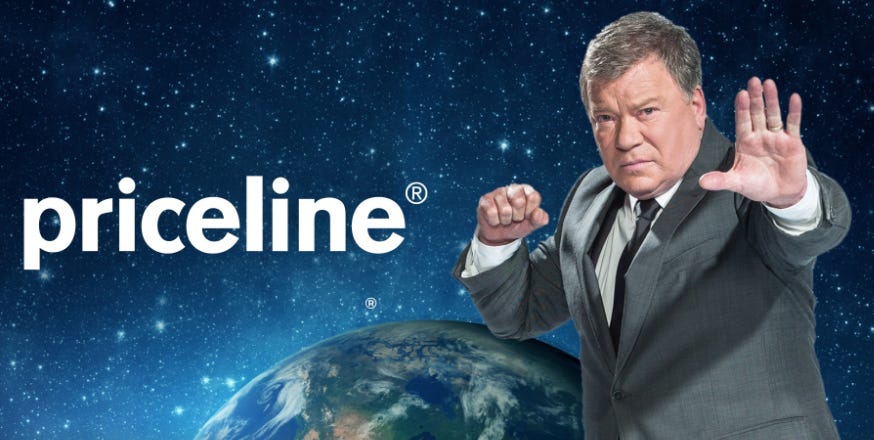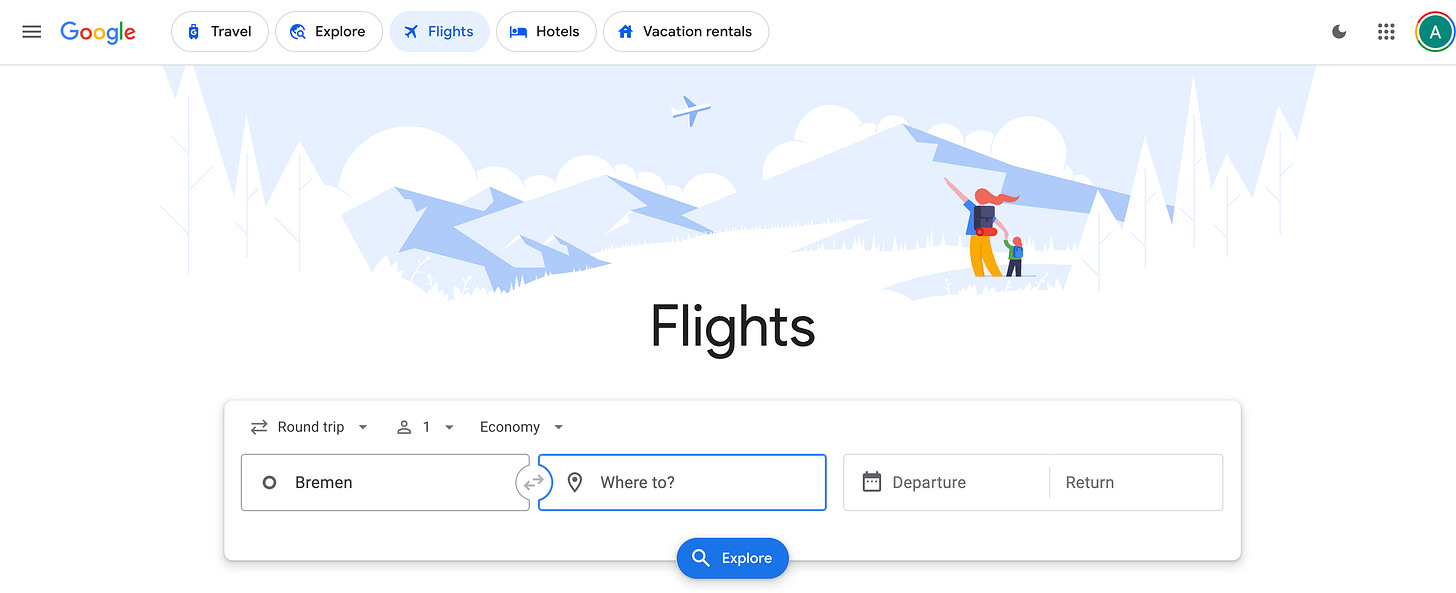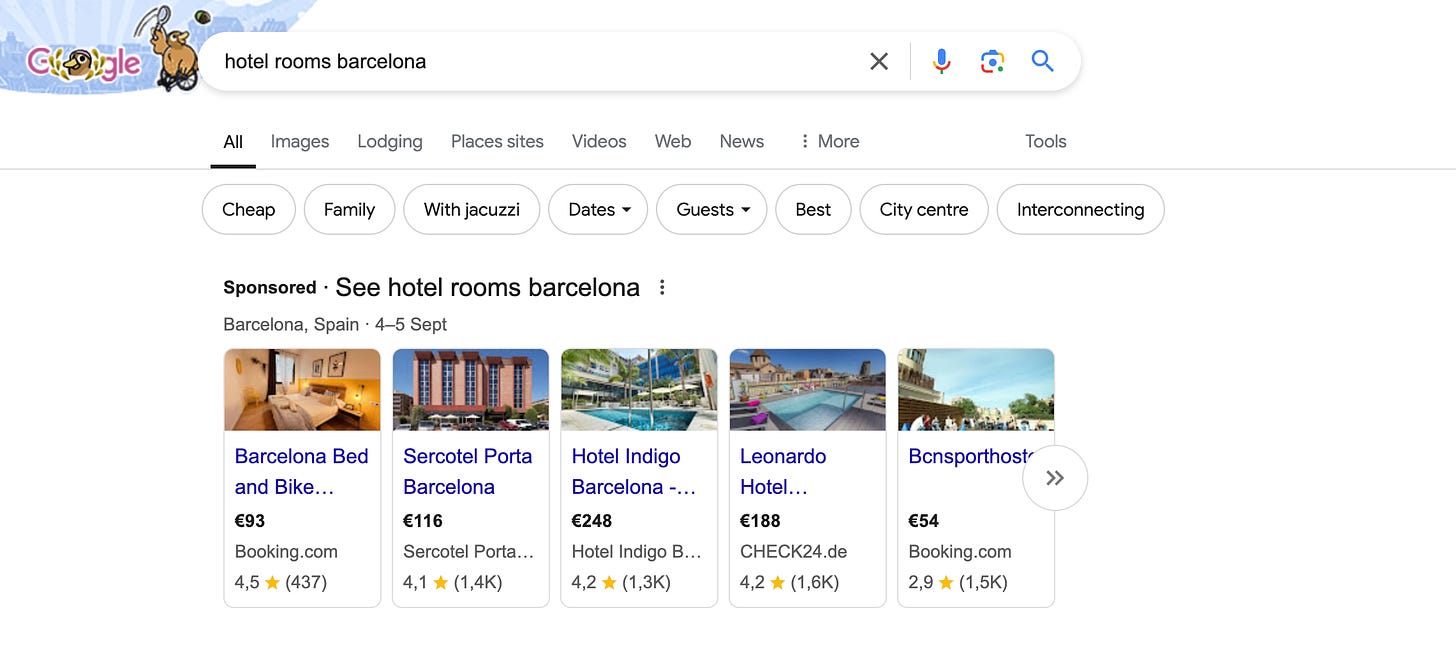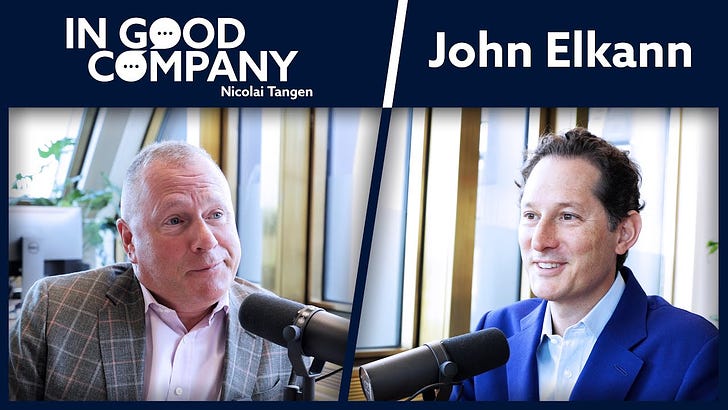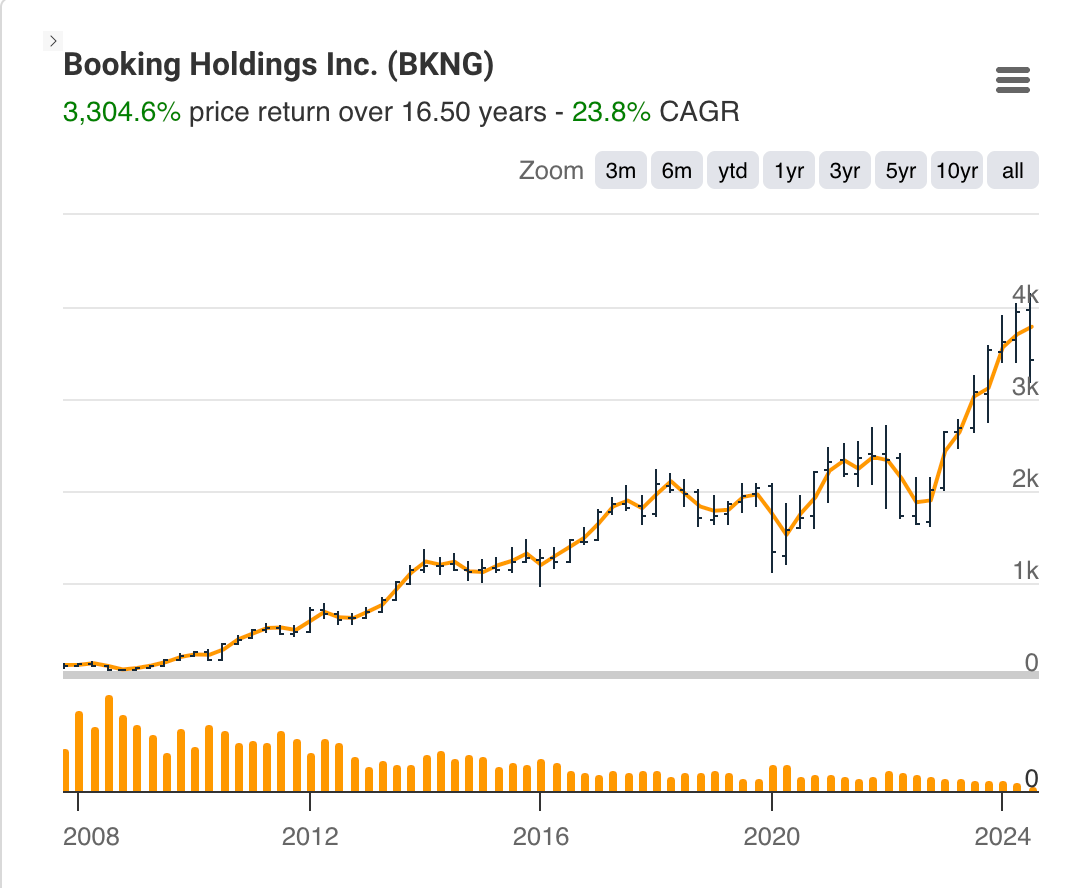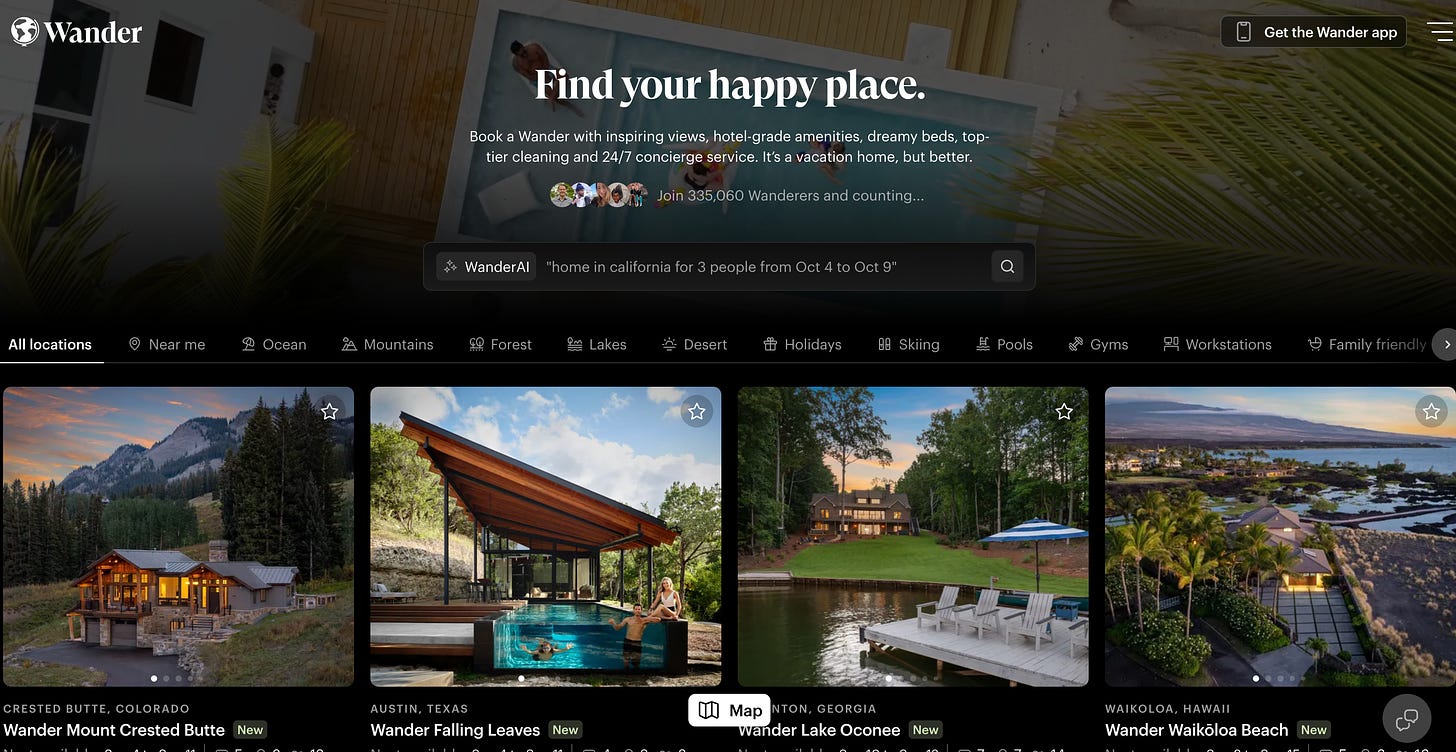Brad Gerstner and his firm Altimeter have made many home-runs throughout the years. They’ve capitalised on the success of Snowflake, Uber, Meta, the gaming platform Roblox, and many others.
One genre of investments that has captivated me (and eluded me, sadly 😭) is public securities that provide venture capital returns. They can be found everywhere - not only tech:
Dominos Pizza - up 80x since 2009 (OK I know, it’s a bit of a cop-out to put 2009 as the base year 😉)
Meta’s IPO was another - 15x since the IPO in 2012.
Ferrari at spin-off in 2016 - which I was stupid enough to have and then sell. 9x up from the IPO in 2016.
Each of us probably has one of these sitting in their portfolio right now - but might be too “smart” to sit and do nothing.
Brad Gerstner’s first trade for Altimeter in 2008 happened to be one of these:
Priceline (now Booking Holdings) in 2008. Up around 37x since the initial buy
Hanh-dawg had it right. When you get a good idea, just sit there - after hitting subscribe 👇
Access more investment breakdowns and (soon) podcasts with more details on each breakdown.
Origins of Altimeter Capital
VC
Brad Gerstner is a lawyer by training. He came into VC firm General Catalyst quite early on, and though it’s not clear which investments he was responsible for, there’s a chance he had a good look at Kayak, the metasearch agent for travel, which ultimately ended up as part of Booking Holdings in 2012.
His experience with the travel technology industry also includes CEO experience at a GC portfolio company, National Leisure Group (NLG), where he led the company from 2000 to 2003. NLG was an online cruise booking agency, letting Gerstner develop his understanding of the travel business.
Apprentice to Paul Reeder
Brad Gerstner was the protege of Paul Reeder, founder of PAR Capital Management. From 2005-2008 he successfully ran a technology investment arm of the company, and led the crossover strategy into certain VC bets - Zillow being the most notable of them.
Paul Reeder was a large influence on Gerstner’s investing style and philosophy, giving him the confidence to build his own investment firm. Gerstner said in a 2023 interview that he still speaks weekly to Reeder after 20 years - showing the power of strong mentorship and career backers.
Altimeter
I’m guessing Brad Gerstner was already financially independent by 2008 after many successful venture exits and great investments. But it was still a bit of a jump to start his own fund.
He had “secured” commitments from endowments and other funds in the hundreds of millions of dollars.
I was lucky enough to be trained in the hedge fund business by Paul Reader and some of these greats so I understood the public market business. 2008, I certainly didn't think the world was going to be as bad as it was. I had some endowments who had promised me some money at the end of 2007. But this is a good lesson, starting any business, right? So 2007, the world's pretty good. Some people say, hey, we'll give you a couple of hundred million dollars. Go start a fund. We like this idea you have. Public and venture. Move to Silicon Valley. I get married at the end of seven. I have my first child in June of eight. And I had made the plan. I'm going to launch this firm.
Of course, during the GFC in 2008, those “commitments” evaporated - and his business was almost toast.
Inspired by Seth Klarman and his mentor Paul Reeder, who also started with very small AUM ($20M and $5M respectively), Gerstner decided to move ahead and start with only $3M in 2008 with commitments from friends and family.
The 2008 financial crisis was not a great time to start anything though. There was a huge chance of failure and of investors and service providers pulling away their support. However, in the chance that something worked, it had the potential to work big!
Of course, that’s exactly what happened to Altimeter.
How did Priceline Start?
Priceline started in 1997 with the idea to let consumers name their own price for hotel rooms and airline seats. It was a win-win for hotels and airlines: They offload unsold rooms and seats to Priceline. Priceline in turn lets consumers name their price and clear expiring rooms/flight seats quickly.
They got traffic and attention initially by getting William Shatner to be the spokesperson. He got stock in return (which unfortunately he sold at the exact wrong time!).
The business made some ill-fated expansions during the Dotcom Bubble - as explained in the Priceline company history:
We were ambitious. In 1999, we grew rapidly and were now publicly traded. So we figured, if naming your own price for flights and hotels was working so well, why not new cars? Why not mortgages, or gasoline, or groceries? We even developed a site, Perfect Yardsale, that let folks name their own price for used lawnmowers and household goods.
Obviously that came to an end when the Bubble burst, leaving many once-promising internet darlings stranded with high cash burn rates, but no access to capital. Priceline, however, had a strong travel business that it could fall back on. It decided to focus on travel: hotels, rental cars, and flights.
The company ran a Superbowl ad in 2002 which gave them yet again huge organic traffic to the website. They also introduced full-price travel to their website - not only the discount deals where consumers name their own price. In this way the company became a one-stop-shop for American travellers.
What’s also key about this business is that it had extra downside protection during hard economic times. In hard times, consumers became price-sensitive, searching for deals. Likewise, airlines and hotels had more vacant seats and rooms to fill with consumers cutting back. The only real winner was Priceline during these times.
The company got to cash profitability in 2003 - which meant that capital markets became more willing to provide equity and debt for the first time since the Dotcom Crash. Additionally, employees felt a reasonable likelihood that the company would be around in a few years - and therefore stock options became an attractive way to induce talent to work at the organisation.
In other words: Priceline was in business.
2004 - Priceline as Sugar Daddy 💵
Once Priceline achieved cash profitability, the next step was conquest. Priceline was dominant in the US - and the US had above average (at that time) rates of both internet adoption and travel moving online.
Europe was a fast follower. Priceline had to be there. Here’s what they said in 2005 on strategy:
Become the top online hotel reservation service in Europe. The size of the travel market outside of the United States is substantially greater than that within the United States. Historically, Internet adoption rates and e-commerce adoption rates of international consumers have trailed those of the United States. However, international consumers – particularly European consumers – are rapidly moving to online means for purchasing travel. Accordingly, recent international online travel growth rates have substantially exceeded and are expected to continue to substantially exceed the growth rates within the United States.
So the playbook was clear.
Now that Priceline was profitable, it could invest cash to grow overseas and grab a piece of the rapidly growing Europe online travel market - either through acquisition or organic growth.
They chose acquisition, and boy did it work!
Here’s the list of deals they did over the years. It puts to shame almost every VC fund in operation:
Active Hotels (2004) - UK-based hotel reservation service, acquired for $161 million
Bookings B.V. (2005) - Amsterdam-based online hotel service, acquired for $133 million
Agoda.com (2007) - Asia-based leader in hotel accommodations
TravelJigsaw (2010) - Multinational rental car service, now known as Rentalcars.com
KAYAK (2013) - Global travel search tech company
OpenTable (2014) - Restaurant reservation platform
PriceMatch (2015) - Cloud-based data and analytics solution for hotels
RocketMiles (2015) - Chicago-based company allowing travelers to book hotels while earning airline miles
ASDigital (2015) - Leading provider of restaurant table and reservation management solutions based in Australia
Momondo Group (2017) - Leading European meta engine for flights
HotelsCombined (2018) - Hotel Metasearch engine
2005 - Booking.com Acquisition
Everyone knows what Booking.com is now. It would therefore be wasted words to simply describe the platform.
I’ll instead explore a reasons why Booking.com sold to Priceline in the first place.
Cash
As told by an early employee there:
Agreed, that was a legendary acquisition.
That being said, I think it was not a mistake for the previous owner(s) to sell at the time. Priceline had cash, and the marketing heavy ("buy ads in January, stay in summer, bill hotel at the end of the month after the stay") business had significant cash flow challenges in terms of growth.
Cash is king.
Priceline was gushing cash, as it grew through word-of-mouth in the pre-Google days. Additionally, giving William Shatner stock to promote Priceline was a non-cash transaction which paid off far into the future. Therefore they did not have the same cost and cash flow disadvantage of acquiring traffic as the early Bookings B.V.
Bookings. B.V., however, was marketing-spend heavy and had to pay for Google ads in H1, only collecting revenues from traveller bookings in H2 after the summer travel period.
It was a tough way to make money - and accounts receivable financing for a small online business would have been next to impossible.
Therefore the acquisition seemed to be a win-win.
Booking B.V removed the cash bottleneck that hampered growth by leveraging Priceline’s strong cash flow conversion to grow (although they seemed to be doubling every year at the time anyway) - and Priceline picked up a fast-growing asset that could dominate the European landscape.
There was another benefit to being acquired:
Infrastructure 📁
In the beginning, Bookings B.V. was able to leverage the infrastructure (servers, engineers etc) of Priceline. This removed yet another bottleneck on the rapid growth of Bookings B.V:
Historically, the benefits offered by Priceline group to booking were IMO chiefly aforementioned cash flow for growth, and shared technical infrastructure (WAN, shared colo space).
However, it seems that Bookings B.V. quickly outgrew the average rate of infrastructure growth at the mothership Priceline. Eventually the decision was made again to separate Bookings B.V. infrastructure from that of the rest of the company:
Booking had outgrown the group infrastructure team's ability to scale. The perpetual culture clash eventually led to the central infrastructure group being broken up (very much an outcome driven by the booking CTO, Brendan Bank). So we built our own network and DC team since we had far, far outgrown the infrastructure needs of other group companies.
What the infrastructure challenges of Booking.com show me is that there’s never a one-stop solution to centralising or de-centralising a function. Everything has to be contextualised.
After all, now after preaching de-centralisation for many years, Berkshire too has started to centralise some functions under Greg Abel. A cash sweep is one of these things - where formerly, Warren Buffett would call the various company CEOs and ask them for extra cash if he needed it to buy something else. Now the process is a bit more formalised.
It makes sense to tidy up a cowboy operation once in a while!
Culture
I lived in Netherlands for around 3 years. What’s maybe not appreciated internationally is how entrepreneurial the Dutch are. Almost every person I know there has a side hustle - some of them regular readers of Capital Buddha ;)
Therefore outside of the US it really doesn’t surprise me that some of the scrappiest growth hackers come from the Netherlands. Bookings B.V. was no exception.
Up until their marketing budget was around $100M, they apparently had only 2 people in their marketing department. How was a culture like that allowed to survive when swallowed up by an American corporate giant with governance and risk assessments?
Here again, the engineer on YC forums tells us about the Priceline company culture:
I was there from 2010-2017. The philosophy of the holdings was to let its constituent companies execute independently and even compete (this included Priceline.com, Agoda, Kayak, rentalcars.com, OpenTable, etc). Therefore the culture of booking.com remained fairly intact for a very long time.
Buying something and leaving it alone is super hard. So I tip my hat to Priceline for being able to do that.
2005 onwards - Booking.com Growth Hacking 📈
Priceline acquired both Active Hotels (2004) and Bookings B.V. (2005) - and merged the two firms to create Booking.com. As previously mentioned, the culture of Booking.com remained intact - and they were allowed to pursue their strategy of aggressive data-driven growth to capture a winning slice of the European online travel market.
Again, from our nameless early engineer at Booking.com from the YC Forum:
For a long time, Booking was so focused on only doing things that were strictly measurable and attributable that we didn't do any brand advertising or classical marketing (cf. quantitative fallacy). We co-grew with Google search ads in particular and had built very significant tooling around AdWords since the Google provided infrastructure didn't scale. Unofficially, we were the largest ads customer for a long time spending billions annually at useful ROI. This "stealth mode" meant that we weren't getting a lot of DDoS type threats to deal with for example and likely less fraud risk. It also meant that we always chuckled in earnings calls when analysts praised the "Priceline business being very successful overseas". Eventually reality caught up and PCLN became BKNG - Booking Holdings.
Measurability of investment was a key part of the investment ethos at Booking.com. This engineer worked at Booking Holdings from 2010-2017 and mentioned that even then, Booking.com was the largest Google ads customer. It’s no secret then that Booking.com eventually overwhelmed the mothership Priceline and became the captain of it:
In 2018, Priceline recognized that Booking.com had become a monster within the company. They renamed Priceline to Booking Holdings to reflect the subsidiary’s growth to dominate the rest of the group.
Business Model in a Nutshell
It was clear that travel was moving online.
I remember when my mum used to go to travel agents to book our trips when I was a child. She’d sit there and negotiate, wait for the travel agent’s slow computer to load, and then we’d get some sort of highly-priced plane ticket and accommodation.
Priceline/Booking’s business was to help airlines, hotels and rental car companies offload their spare inventory. Booking Holdings especially used Google ads to drive consumer traffic to its site and fill rapidly expiring inventory (i.e. once a flight takes off, an empty seat is lost money - and likewise for hotels: if there are vacant rooms that is lost money).
Of course every smart 20 year old could figure out that business model and copy it. Online travel was a growing pie with plenty to eat for everyone. I have no doubt that there were hundreds of copycats to start with.
However, eventually Booking’s business became a traffic aggregation business. Consumers went to Booking.com as they knew the largest selection of hotel rooms was there. Hotels likewise went to Booking.com to fill their unsold inventory as all the travellers were there.
Now there was just the matter of dependency upon Google to drive customer acquisition. There’s still not a lot that can be done about this. Google is the gatekeeper of the internet. However, things like Booking.com’s Genius program allow repeat travellers through Booking.com to obtain discounts.
Frenemies: Google and Booking Holdings
Booking Holdings became one of the largest spenders on Google. And as our friend the YC forum pointed out before, for many years they were the largest spender - flying under the radar. And as mentioned before, Bookings B.V. had a marketing department skilled with using Google SEO.
They’ve adapted along with changes in Google SEO and probably still have the best skills to aggregate online traffic. What’s more is that they now have a boatload of cash to outbid anyone else on their favourite search terms.
Skills and cash make a dangerous combo!
Over the last 12 months, Booking Holdings has spent $12B on SG&A which most likely consists of a few overheads and a massive chunk of Google ad spend. It’s quite clear, therefore, that the two are frenemies in the online ecosystem.
Booking Holdings depends on Google’s ability to aggregate traffic through its search dominance. Booking Holdings depends on its expertise and spending on Google SEO to drive traffic and take commissions on online travel.
Like an old married couple, they bitch about each other, yet depend upon one another at the same time.
Google Encroaching upon Travel
Google has gotten in trouble over the past few years for trying to crack into profitable industry verticals and search categories. Online travel has a large profit pool, and Google can quite naturally extend there:
with launches like Google Flights:
and directly displaying hotel results: 👇 , you can see that the intention was clear to compete in the space.
Google succeeded in Flights, intermediating meta search engines like Skyscanner quite nicely. However, in hotels they had mixed results - and probably chose to stay away for regulatory reasons - given that they have a business that overall prints around $90B profit every year. It would make no sense to take regulatory risk to compete with a customer.
I’d predict that Google will stay away from Booking’s business going forward - and that leaves Booking to fight it out with other travel businesses, rather than worry about its main supplier of traffic competing against it.
There are better analyses of this Frenemy relationship out there.
I’ll top them all just by repeating that they’re like an old married couple 😜.
Learnings from the Investment 📓
There’s a few little pieces that make this investment special and a learning opportunity. I dial it down to 3 things:
Concentration
Time Horizon
High Leverage
Concentration
Brad Gerstner put around 45% of Altimeter’s cash into the Priceline investment in 2008. Sure, he started with $3M and may have been confident of being able to raise more over time. But still - 45% is a lot of money!
Why would someone do that?
On the personal front, 45% of Altimeter came from friends and family. Gerstner himself probably had enough money to live off, having sold 2 start-ups prior - so what looked like concentration was maybe not a meaningful amount of Gerstner net worth. Also, the money apparently came from friends and family - who probably in turn also had some measure of diversification (I’d be surprised if they put 100% of their own net worths into the fund). In summary, the risk here was not personal financial ruin - but reputation risk (which maybe could have been turned around over time).
The second factor is industry knowledge. It’s not like Gerstner just researched Priceline 2 weeks before investing in it. He had spent the preceding decade in travel, running multiple companies, and handling PAR Capital’s tech investments. Knowing the space gave him two important advantages:
Understanding the mega-trend - The wave of boring industries going online was major. It was secular, and would take decades for the S-curve to play out - resulting in big winners overall.
Understanding which player to back - This was the hard part. Gerstner’s travel industry experience helped him separate the winners from the losers. The ability and professional network to understand the latest in travel, and, the latest in the internet, was a huge knowledge advantage relative to most public market investors.
There’s another point that helped with (2) - a recession!
In 2008, consumer travel budgets took a big hit as the Financial Crisis had an impact on jobs and morale. The brutality of capitalism culls the weakest or the unluckiest - and would have most likely knocked out a bunch of competition from Priceline/Booking Holdings. Starting Altimeter in 2008 was advantageous in this regard. He got to see which businesses crawled out of the wreckage in an industry where he knew a lot.
When all these things line up, concentration makes sense.
Time Horizon
There are many people with the right ideas who simply don’t give them enough time to play out. Brad Gerstner was right to identify that travel itself would continue to grow. He was also able to identify that an online aggregator for travel would win even bigger - and stay ahead.
The knowledge wasn’t unique, however.
What was uncommon about Altimeter’s investment was to stay with an idea long enough - what is particularly difficult in a fund structure with frequent redemptions. I wrote an Investment Breakdown with the opposite result - which was Mohnish Pabrai’s investment in Fiat/Ferrari here:
It wasn’t a failure of an investment - quite the contrary. However, what it showcases is that the ability, client base, and structure to hold great assets and ride off into the sunset is surprisingly hard - and here I talk about Ferrari more than the clunky auto business.
Through the spikes, through the drawdowns, through recessions, through the lawsuits. A cursory look at the chart below shows us that there were several times the market doubted Booking’s position in the online travel business.
A fund manager with more client scrutiny might have sold early at the sign of first trouble. Gerstner holding onto Booking stock meant that his client base was patient, or maybe that they trusted him - allowing him to continue riding the winners off into the sunset.
Booking Holdings was no longer in Altimeter’s 13F filing as of the beginning of 2022. So it seems the investment was held from 2008 to 2022 - approximtely a 20x return on the original investment, at a CAGR of around 25%.
Not bad for buying something then doing nothing!
High Leverage
Here I don’t mean financial leverage - i.e. borrowing money. I mean finding the right business model with a operating leverage. Over the past decade, many of these “high leverage” winners have been found in the technology space.
Once Priceline/Booking established that it could drive traffic with slick Google keyword investments, it became a demand aggregation business. Every traveller knew they could find the most travel options on Booking Holdings platforms. Every property owner had to list on Booking Holdings platforms to get maximum occupancy numbers. That gave Booking Holdings lower customer acquistion cost over time, and therefore more money that they could throw at Google ads to ward off competition for traffic.
Therefore, through Booking’s journey, each additional dollar of growth required little to no additional capital to be invested.
Side note: Maybe apart from a working capital injection from Priceline at the time of acquisition.These are the ideal businesses to own. And what’s empowering about Brad Gerstner’s example is that you don’t have to buy these things in private markets. They are often hiding in plain sight - also for individual investors.
Booking Holdings Competitive Landscape
Type in a Google Search for flights, hotels, rental cars or anything related to travel and you’re likely to see Booking.com somewhere on the page. You’re also very likely to see links from Expedia, Kayak (part of Booking Holdings), Airbnb, and now the hotels directly.
Since the online SEO-based travel business is mostly mature - it’s likely to be the same companies appearing year after year - unless the business changes way down the line. In other words:
Google aggregates traffic and searches related to online travel
Booking, Expedia, Kayak, Hotels, Airbnb etc. pay Google for that traffic, and have expertise and deep pockets which enable them to do that at a high ROI.
Online travel businesses try various strategies to get users to repeat travel through their platform, circumventing Google ads for the traveller’s next trip.
Brad Gerstner said in 2014:
As we said today, if you are going up against Priceline or Expedia today, you had better have a product that is 10x better or doing something that is different. Because you are never going to be able to outspend them on marketing. Airbnb did something that's different.
Airbnb (the company that did something different)
Booking Holdings were selling unused inventory at hotels, planes, rental cars etc. Airbnb was selling a night’s stay at someone’s spare bedroom - offering a slightly homier atmosphere and maybe a more authentic local experience of a place than a soulless hotel.
Airbnb has a specific mouse-trap that brings consumers specifically to their platform - and one that was growing like hell. However, Booking Holdings has started to build their own “alternative accommodations” business (from Q2 2024 Earnings Call):
And one of the things we've been building, and we've been working hard on, and I've talked about it for a number of years, how important it is for us to build an alternative accommodations business that will rival anybody's. And we admitted that it was taking us time to build it. We started from behind. Another company may have had a bigger head start on us and building it bigger. We think we've done a really good job of catching up. I love the last call we did a few months ago when we came out and we talked about it, our homes business, our homes business, more than 2/3 of the biggest player in the industry.
So it seems like the competition between Booking Holdings and Airbnb is about who can become more like the other the fastest. Again, here’s a quote from Booking Holdings Q2 2024 Earnings call:
Now I don't really care whether the customer uses a home, or a hotel, or a villa or an igloo. I don't care. I care they get what they want. That's the important thing. And then come back. In terms of the profitability of one versus the other, we can go into that and talk about it, but it's not really relevant. Because what's relevant is making sure that they use what they want. We don't try and steer them. We're trying to just make sure they have the best tools to choose what they need in the long run. That's the way we'll win and create a great business.
Booking Holdings has gone through several stages of evolution, adaptation, and growth. Here’s a summary:
Priceline gets consumers to their website in a pre-Google world.
Priceline goes on a global conquest through acquisition.
Bookings B.V’s Google ads expertise drives incredible growth - making Booking Holdings become an online travel aggregator.
Frenemy ecosystem with Google. Booking Holdings rides secular wave of travel moving online, plus the wave of a 2-sided marketplace - driving traffic through Google ads.
Booking Holdings tries to become Airbnb.
What’s Next for Online Travel?
It’s tough to say what’s next. What’s for sure is that the profit pool for online travel is so large that there’s always someone searching for a way to disrupt it and take share.
Another slightly different thing
Airbnb was the first different thing. It gave people a totally new way of looking at travel - and potentially giving people more authentic experiences of a place.
There are new platforms like Wander that cater to the ultra high-end of travel, seeking to steal share off Airbnb and Booking.com. The UI of Airbnb, its dodgy cleaning fees, or the crappy UI of Booking.com can scare away those with deep pockets. So it makes sense that there’s a me-too competitor with cleaner UI.
Platforms like Wander advertise on a few business podcasts that I listen to, trying to tap into high trust listener bases of internet personalities, rather than a more general approach of buying traffic from Google.
OK - that’s fine, they might steal a couple of points of market share here and there.
But is there a bigger platform shift on the horizon that might affect the cosy industry oligopoly in a much larger way?
AI?
The two most famous letters of 2024.
The online travel platforms have also started messing around with AI, claiming to possess unique ability to help travellers find their dream trip through chat bar prompting.
What might this do to the industry? Who knows?
All I know is that when there’s a platform shift, there’s usually a new-tech native company that can disrupt the old dinosaurs. Doing so would mean the online travel incumbents would have to scramble to adapt - probably cannibalising their old, more profitable business to do so.
Side note: A great example of the above is Facebook jumping to mobile from desktop. It wasn't mobile-native to start with, but made a pivot to mobile when it was clear that Desktop would not be the main source of growth going forward.
However, the real genius move they made was buying Instagram, which was mobile-native - letting them grow super fast and capture the new platform before incumbents realised what had happened.I have no idea what the AI-native travel business looks like. I have no idea whether it’s a front-end virtual assistant-type thing, or whether AI gets plugged into the back-end to lower costs and improve search. I have no idea whether the winner somehow circumvents Google - or how the future online travel transaction takes place.
However, what we have learnt is that the management of Booking Holdings are good at adapting and acquiring hot travel businesses. Perhaps they can pull another rabbit out of the hat and buy the AI disrupter before they get too large.





